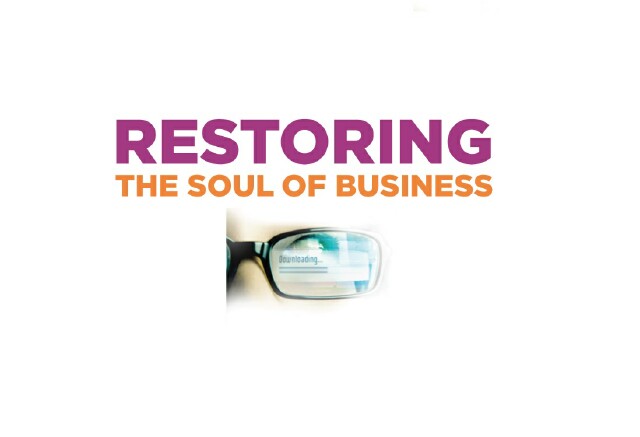Re-Thinking Purpose

Ipsos publishes an award-winning strategic foresight magazine called What the Future. Matt Carmichel, What the Future editor and head of the Ipsos Trends & Foresight Lab, recently spoke to me for an article about purpose, which this post is built on.
What’s the state of purpose today?
There are three ways to look at it. The first is that purpose is a core differentiator. A survey by Deloitte indicates the following:
"Purpose-oriented companies have higher productivity and growth rates, along with a more satisfied workforce who stay longer with them. 5 Our research shows that such companies report 30 percent higher levels of innovation and 40 percent higher levels of workforce retention than their competitors.6 While traditional trends might dominate purchasing behavior, new opportunities exist to connect with customers through purpose.
"In 2019 consumer survey showed that price and quality remain the biggest factors driving customer decisions. 7 However, many of the same respondents (55 percent) believe businesses today have a greater responsibility to act on issues related to their purpose. Those failing to do so risk being displaced by purpose-driven disruptors. For example, Unilever’s 28 “sustainable living” brands (i.e., brands focused on reducing Unilever’s environmental footprint and increasing social impact) such as Dove, Vaseline, and Lipton delivered 75 percent of the company’s growth and grew 69 percent faster on average than the rest of its businesses in 2018 (compared to 46 percent in 2017). 8 Soap, petroleum jelly, and tea are everyday household essentials, but by promoting sustainable living, these products became differentiated as they embody the company’s purpose."
It is interesting to note that Unilever has not done well recently and changed management, which makes many believe that purpose can be overplayed.
On What Next?, a podcast I host, we recently had two different guests talk about purpose and each provided a different perspective.
One was from Thomas Kolster, who basically said, "Forget everything you know, about brand purpose." His basic belief was that businesses are now trying to position themselves as heroes, but they're not heroes. Customers are heroes and they say, "This is my purpose."
This second perspective is yes, purpose is important, but forget brand purpose and align with customer purpose.
The other was from Steve Harrison, who believes that purpose is over-hyped and that companies have forgotten that they exist to make things, sell things and create jobs. Anything that makes them not remember they're providing jobs, selling things and making things and instead come up with social concoctions means they have lost the plot.
This third perspective is, purpose is bunk. Make things. Create jobs. Ship things and stop all the mumbo-jumbo.
Why purpose is important but needs to be nuanced and authentic.
For most firms reality lives between these perspectives.
Purpose is important because it is one of the "whys" that Simon Sinek says a company needs. Purpose is also important to attract and retain talent.
People are very interested in what the purpose of the company is, even if the purpose is, "We make great products." Many people are now looking not just to join a company for money, fame or power, which are important, but for the comnpany's purpose, values and connections.
But a company should be very clear that when they are identifying a purpose, it has something to do with their industry.
If it sounds bombastic it will bomb.
Authenticity is key, which means tight and believable scope versus "we are here to save the world" that gets everybody who is in the real world either rolling their eyes or shrieking with laughter.
Businesses and brands are stepping into an unfortunate void.
People are looking to brands and companies to solve problems because they have decided to give less credence to media and government. If media and government did their jobs, we wouldn’t look to brands and CEOs to fill in!
The purpose trend and the need for CEOs to increasingly take positions way outside their business and expertise is due to a crisis of leadership. A breakdown of trust and a refusal to see the world as it is. If leaders actually led, which means identifying reality, fixing problems and delivering products and services, people would not say, "What about purpose?"
That is their purpose. Fix problems. Think long term. Look after people. Ship product. Build infrastructure. Create jobs.
Why purpose is hard.
Often it is Ben and Jerry or Patagonia or Unilever that are trotted out for case studies. There are many other examples, but not too many that resonate and ring true because it is difficult.
Purpose is principles. If you're principled, you’re going to do things that will potentially hurt your career, hurt other people, or hurt financial performance because you decide to say, "That doesn't fit my principles."
Those brands take a stand and the stand pisses off certain people.
What a lot of companies today are doing is adding purpose because they don’t want to piss off people, which is the exact opposite of what purpose is. Purpose is taking a stand! But too often it is a thin veneer of paint on the surface and and not deeply intertwined into the internal brand and company architecture or culture.
Areas that brands can align with which are critical but not politically fraught.
There are three places that brands can help that aren’t politically driven.
Helping people grow old. All over the world except for Africa every country is aging fast. The elderly or the "seasoned" in many countries have many challenges from companionship to the need for medicines to financial constraints.
Everybody regardless of political affiliation, sexual preference or gender identity is going to grow old.
Helping people who are hungry. Organizations like Feeding America to local soup kitchens to food banks to school programs all serve humans in need. People in need. Regardless of one's beliefs.
Helping people learn.Brands and companies have great resources -- not just in money but the talent in the companies, technology and much more. Today like never before learning is key. And learning can be everything from internships to mentorship to coaching and much more. Most countries and areas are struggling with education, which in many cases is too expensive, too degree-oriented and too exclusionary. Imagine what any company can do in their markets to lift peoples' skills, which helps both the people and the company by having more people to hire.
What will purpose look like in the future?
Often today purpose is like soufflé at a fancy restaurant. It's basically puffed sugar like expensive candy floss. And a firm often has many purposes -- all different flavors of candy floss.
The future will be more single-minded and unified in purpose that links to your product, shows how you look after your employees with it and shows customers that because of that they will feel better about your product or service.
Brands today are built on three criteria.
The first is delivery of benefits. If you clearly can do something particularly well, that's what you're supposed to be doing. Authentic. Real. Aligned with the business.
The second is purpose, which will require one to have happy employees. Companies who do not look to create joyful employees will not be believed about some mumbo jumbo purpose. Who cares how you source your product or how you will save the climate when you care and look after your employees?
The third is, is the purpose measurably helping people feel better about your product or service?
The future of purpose, highly measurable and very much aligned with the company’s customers, employees and community.
Posted at MediaVillage through the Thought Leadership self-publishing platform.
Click the social buttons to share this story with colleagues and friends.
The opinions expressed here are the author's views and do not necessarily represent the views of MediaVillage.com/MyersBizNet.


